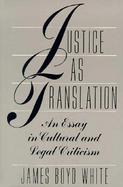Description:
A pioneer in the law and humanities, James Boyd White here develops a way of criticizing the work of judges that he then uses as the basis for a more general method of cultural criticism. White argues that analytic philosophy and economics are inadequate as modes of legal criticism. He turns instead to the practice of translation to expose the intellectual and ethical center of legal experience and to connect it with other forms of cultural action. The unified vision of law and cultural process defined in this book provides a ground both for the criticism of law and for a general understanding of the ways in which we negotiate our identities and build our communities through language.
Expand description

Please Wait

